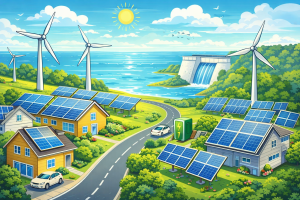Jakarta – The International Energy Agency (IEA), in its latest report, highlights how current geopolitical tensions and fragmentation are creating significant risks to energy security and global action to reduce greenhouse gas emissions.
The World Energy Outlook 2024 report released by the IEA on Wednesday, October 16, projects that, based on current policies, the world will enter a new energy market context in the coming years, characterized by continuing geopolitical dangers but also by a relatively abundant supply of various fuels and technologies.
“In the second half of this decade, the prospect of more ample – or even surplus – supplies of oil and natural gas, depending on how geopolitical tensions evolve, would move us into a very different energy world from the one we have experienced in recent years during the global energy crisis,” said IEA Executive Director Fatih Birol.
“It implies downward pressure on prices, providing some relief for consumers that have been hit hard by price spikes. The breathing space from fuel price pressures can provide policymakers with room to focus on stepping up investments in clean energy transitions and removing inefficient fossil fuel subsidies. This means government policies and consumer choices will have huge consequences for the future of the energy sector and for tackling climate change,” he said.
In its World Energy Investment report, released last June, the IEA reported that global investment in clean energy projects would reach a record high by 2023, bringing the world closer to international climate targets. The report states that funding for clean energy is approaching the USD 2 trillion mark, almost double the investment in fossil fuels such as oil, gas, and coal.
“Clean energy investment is setting new records even in challenging economic conditions, highlighting the momentum behind the new global energy economy. For every dollar spent on fossil fuels today, nearly two dollars are invested in clean energy,” Fatih Birol said.
The World Energy Outlook 2024 report says that assuming current policy settings, “global carbon dioxide emissions will peak in the near future, but the absence of a sharp decline after that means the world will experience a global average temperature rise of 2.4°C by the end of the century, well above the Paris Agreement target of limiting global warming to 1.5°C.”
The report underscores the inseparable link between energy security risks and climate change. In many regions of the world, extreme weather events, exacerbated by decades of high emissions, have posed significant challenges to the safe and reliable operation of energy systems, including increasingly severe heat waves, droughts, floods and storms. (Hartatik/nsh)














